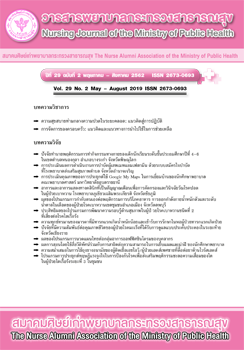The Effectiveness of a Health Literacy Development Program in Patients with Type 2 Diabetes Risking to Chronic Kidney Disease
Main Article Content
Abstract
The purpose of a quasi-experimental study with two group pre-test and post-test design was conducted to examine the effects of a health literacy development program on health literacy, self-management behaviors, urine sodium, blood sugar and glomerular filtration rate of type 2 diabetes mellitus patients risking to chronic kidney disease. The sample consisted of the patients with uncontrolled type 2 diabetes mellitus at risk of chronic kidney disease, having a blood glucose level between 155 and182 milligrams per deciliter and glomerular filtration rate at stage 1 and 2, living in Charoensin District, Sakon Nakhon Province. The sample was selected by stratified random sampling and put into experimental and comparative groups. Each group included 30 persons. Research instruments included 1) a 12 week program of health literacy development which was developed based on the concept health literacy pathway model; 2) a handbook of health literacy for delaying the progression of renal failure from diabetes; and 3) a questionnaire. Content validity indexes of health literacy and self-management behavior sectors were .97 and 1.00, respectively. Kuder-Richardson of health literacy was .78 and Cronbach’s alpha coefficient of self-management behaviors was .84. Data were analyzed by descriptive statistics and Independent t-test. The results revealed that after enrolling in the program, the mean scores of health literacy and self-management behaviors of the experimental group were higher than those of before enrolling in the program and higher than the comparative group at p-value <.05. Urine sodium and blood sugar of the experimental group were lower than before enrolling the program and lower than the comparative group at p-value <.05. The mean glomerular filtration rate was higher than before enrolling in the program and higher than that of the comparative group, but not significantly higher at p-value <.05.
Article Details
บทความและรายงานวิจัยในวารสารพยาบาลกระทรวงสาธารณสุข เป็นความคิดเห็นของ ผู้เขียน มิใช่ของคณะผู้จัดทำ และมิใช่ความรับผิดชอบของสมาคมศิษย์เก่าพยาบาลกระทรวงสาธารณสุข ซึ่งสามารถนำไปอ้างอิงได้
References
2. The Nephrology Society of Thailand. Clinical practice recommendation for the evaluation and management of chronic kidney disease in adults. 2015. Bangkok: Tex and Journal publication; 2017. (in Thai).
3. Charoensin Hospital. Results progress for the year 2017. Sakon Nakhon. 2017. (in Thai).
4. Chuasuwan A, Praditpornsilpa K. Annual report: Thailand renal replacement Therapy; 2559.
5. Bains SS, Egede LE. Associations between health literacy, diabetes knowledge, self-care behav iors, and glycemic control in a lo income population with type 2 diabetes. Diabetes Technol Ther. 2011;13(3): 335-341.dol: 10.1089/dia.2010.0160 [internet]. 2017 [cited 2017 Aug 18]. Available from: https://www.low.nlm.nih.gov/pmc/articles PMC3690006/
6. Bohanny W, Wu S, Liu C, Yeh S, Tsay S, Wang, T. Health literacy, self-efficacy, and self- care behaviors in patients with type 2 diabetes mellitus. Journal of the American Association of Nurse. Version of Record online: 4 Mar 2013 / doi: 10.1111/1745-7599.12017(page 495-502).
7. Dewalt D, Berkman N, Sheridan S. Literacy and health outcomes. Journal of General International Medicine. 2004; 19:1228-9.
8. Edwards M, Wood F, Davies M, Edwards A. The development of health literacy in patients with a long-term health condition: the health literacy pathway model. BMC Public Health 2012; 2:130. doi.:10.1186/1471-2458-12-130
9. Pannark P, Moolsart S, Kaewprom C. The Effectiveness of a program for health literacy development of the patients with uncontrolled type 2 diabetes at bangwua district, chach0engsao province. Nursing Journal of the Ministry of Public Health Research. 2016;27 (3):91-106 [internet]. 2018 [cited 2518 Aug 19]. Available from: https:// tci-thaijo.org/index.php/tnaph/article/view/111192/86931. (in Thai)
10. Bloom BS,et al. Hand book on Formtive Summatie Ealuation. New York: Mc Graw-Hill Book Company.
11. Thanachaikhan N. Preliminary statistics for research. Bangkok: Wittayapat. (in Thai)
12. Moss T. The impact of health literacy on clinical outcomes for adults with type 2 diabetes mellitus advances in diabetes and metabolism. Arch Intern Med 2014;2(1):10–19.doi: 10.13189/adm.2014.020103 [internet]. 2018 [cited 2518 Aug 18]. Available from: https://www.hrpub.org/download/20140701/ADM3-17102378.pdf
13. Boonsiri C, Piaseu N, Putwatana P, Kantachuvesiri S. Effects of program promoting food consumption for sodium reduction on knowledge and urinary sodium in nursing student. Thai Journal of Nursing Council 2017; 32(3) 119-34. (in Thai)
14. Boonkaew N. Relationships between Nursing Journal of the Ministry of Public Health. ;24(3):119-131. (in Thai)
15. Rattanapongsai P, Lagampan S, Pichayapinyo P. Impact of Thai Journal of Nursing Council.2018;31(4):50-62 (in Thai)
16. Souza J, Apolinario D, Magaldi M, Busse A, Campora F, Wilson J. Functional health literacy and glycaemic control in older adults with type 2 diabetes: a cross-sectionalstudy [internet]. 2018 [cited 2018 Mar 12]. Available from: https://bmjopen.bmj.com/content/4/2/e004180.full.pdf+html.
17. Thungtong S. Effects of self-management support program for delayed progression of diabetic nephropathy on self-management behaviors and clinical outcome in patients with uncontrolled type 2 diabetes mellitus [internet]. 2018 [cited 2018 Mar 17]. Available from: https://kb.psu.ac.th/psukb/bitstream/2010/9952/1/392773.pdf. (in Thai)

